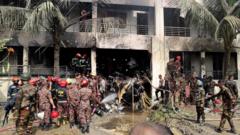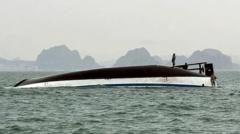On December 29, 2024, Jeju Air Flight 2216 tragically crash-landed at Muan International Airport, resulting in the deaths of 179 individuals. Recent investigation findings suggest the pilots may have mistakenly shut down the wrong engine after a bird strike, affecting the aircraft's thrust and electrical systems.
Investigating Jeju Air Flight 2216's Tragic Landing: Pilot Decisions Under Scrutiny

Investigating Jeju Air Flight 2216's Tragic Landing: Pilot Decisions Under Scrutiny
A recent investigation reveals potential errors made by the pilots prior to the crash of Jeju Air Flight 2216, leading to critical failures during landing.
Article text:
On December 29, 2024, Jeju Air Flight 2216 faced a catastrophic incident as it attempted to land at Muan International Airport, leading to the deaths of 179 passengers and crew members. In a recent preliminary investigation, details emerged suggesting that shortly before the crash, the pilots decided to switch off the left engine, which had sustained less damage from a bird strike, leaving the aircraft powered only by a severely compromised right engine that ultimately caught fire.
According to sources familiar with the ongoing investigation, the pilots' decision to shut down the engine may have resulted in a critical loss of electrical power and thrust, severely limiting their control during the emergency situation. As the aircraft approached the runway, it was unable to lower its landing gear, leading to a belly landing. Within moments of touching down, the plane skidded along the tarmac and collided with a concrete barrier, igniting a fierce blaze upon impact. While two flight attendants survived, all passengers and other crew members tragically lost their lives.
These latest findings, which were discussed with victims' families over the weekend, have intensified scrutiny regarding the emergency procedures executed by the flight crew. U.S. aviation experts have noted the possibility that the pilots might have misidentified which engine required shutdown, although they advised caution in forming conclusions until further data from the cockpit can be thoroughly analyzed.
“I have significant concerns about their situational awareness,” stated Joe Jacobsen, a seasoned aviation safety expert with experience at Boeing and the Federal Aviation Administration. He indicated that the loss of cockpit displays post-bird strike could have voided the pilots' understanding of the damage sustained, complicating their decision-making process.
As investigators in South Korea continue to gather evidence, including cockpit recordings and maintenance logs, the aviation community remains on alert about the implications of this tragic event and the critical lessons it may provide for future air safety protocols.
On December 29, 2024, Jeju Air Flight 2216 faced a catastrophic incident as it attempted to land at Muan International Airport, leading to the deaths of 179 passengers and crew members. In a recent preliminary investigation, details emerged suggesting that shortly before the crash, the pilots decided to switch off the left engine, which had sustained less damage from a bird strike, leaving the aircraft powered only by a severely compromised right engine that ultimately caught fire.
According to sources familiar with the ongoing investigation, the pilots' decision to shut down the engine may have resulted in a critical loss of electrical power and thrust, severely limiting their control during the emergency situation. As the aircraft approached the runway, it was unable to lower its landing gear, leading to a belly landing. Within moments of touching down, the plane skidded along the tarmac and collided with a concrete barrier, igniting a fierce blaze upon impact. While two flight attendants survived, all passengers and other crew members tragically lost their lives.
These latest findings, which were discussed with victims' families over the weekend, have intensified scrutiny regarding the emergency procedures executed by the flight crew. U.S. aviation experts have noted the possibility that the pilots might have misidentified which engine required shutdown, although they advised caution in forming conclusions until further data from the cockpit can be thoroughly analyzed.
“I have significant concerns about their situational awareness,” stated Joe Jacobsen, a seasoned aviation safety expert with experience at Boeing and the Federal Aviation Administration. He indicated that the loss of cockpit displays post-bird strike could have voided the pilots' understanding of the damage sustained, complicating their decision-making process.
As investigators in South Korea continue to gather evidence, including cockpit recordings and maintenance logs, the aviation community remains on alert about the implications of this tragic event and the critical lessons it may provide for future air safety protocols.




















